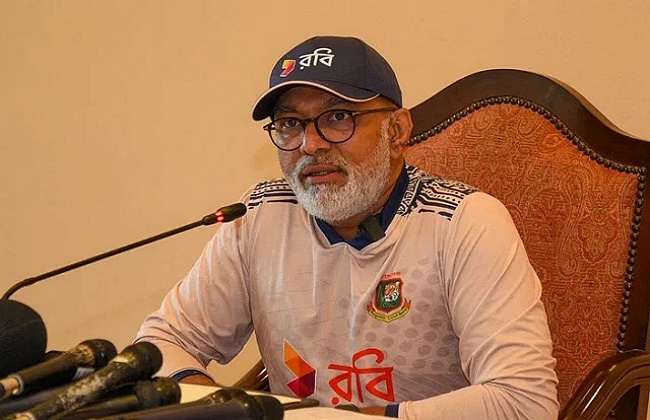
There has been much speculation regarding the national cricket team’s head coach Chandika Hathurusinghe’s future. Bangladesh Cricket Board (BCB) president Faruque Ahmed has been facing questions over this wherever he appeared before the media since taking over.
The board president is taking a diplomatic approach sometimes while answering relevant queries, and sometimes he is making it clear that he still feels the same about the coach as before that he doesn’t want the Sri Lankan as the coach of the national team.
However, it seems Hathurusinghe doesn’t want to pay any heed to these negative discussions circulating around him in Dhaka in the middle of the ongoing Test series in Pakistan.
But no one can completely ignore something when it is related to their own future and livelihood. In particular when the personal consent of the board president himself goes against the coach and he is not shy at all to openly admitting this, then the message is clear.
However, Hathurusinghe wants to keep his focus fixed on the second Test match at Rawalpindi at all costs. Even if something is going on in his mind, he is not showing it to maintain his professional approach.
His message to the players is also the same – keeping focus on the game regardless of whatever is going to happen to him. The Sri Lankan expects the team to stick to the plan they devised for the Pakistan series till the end. The moral of his message sounds like this, “I will take care of my things, and you just do your job.”
Chandika Hathurusinghe, however, cleared his expectations regarding his future in the press conference prior to the second test. He said, “The new leadership (of BCB) will come up with a new approach. I can understand that. I am waiting to talk to them in person. My duty is to prepare the team as best as I can. We have been working so hard for the last few months and we are not doing anything different now either. Our focus is solely on the next match.”
The veteran coach also hopes the board won’t take any decision before talking to him face to face. Currently he has a contract till the Champions Trophy to be held in February next year. If the BCB wants to terminate his contract before that, then the coach will expect a logical explanation.
As per the contract, the board will have to pay Hathurusinghe three months’ salary as compensation, which would be over USD 100,000 including income tax. The BCB may take this path if it wants to get rid of Chandika Hathurusinghe before the Champions Trophy. But it will further weigh the awkward ‘tradition’ of the BCB of bidding farewell to foreign coaches before their contracts end. Both of the previous coaches – Steve Rhodes and Russel Domingo were terminated by the board before their contracts expired. Besides, some of the coaching staff that had completed their contract was not on good terms with the board in the end.
If Hathurusinghe’s name also gets added to the list, then any foreign coach will think twice before taking charge of the Bangladesh cricket team. Besides, we are talking about Hathurusinghe’s departure at such a time when the team is playing well and showing signs of a good Test team in the coming days after so long. However, the board can also think about local coaches for the makeshift duties. It is learnt that a local coach, who has past experience of working with the national team, is already under the consideration of the board.
There will be some important decisions about cricketers: Faruque Ahmed
There are also disagreements within the BCB over appointing local coaches as the head coach of the national cricket team as the works of coaches are not limited within the field only. The coach will have to handle everything on and off the field. In that case, there are doubts about how efficient the local coaches would be in big overseas tournaments such as the Champions Trophy.
Besides, this is also to be seen whether effective coordination among the coaching staff can be developed when all the coaching staff, except the head coach, are foreigners.
*This report appeared on the print and online versions of Prothom Alo and has been rewritten in English by Ashish Basu
